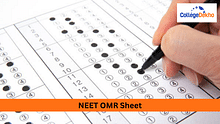NTA The NEET 2025 Tie-Breaker Policy has been revised by the NTA this year. According to it, a seven-point method has been introduced to break tie, followed by a random selection process under the guidance of an expert committee if the tie still persists.

The NEET Tie-Breaking Policy 2025 has been revised by the NTA as per the NEET 2025 Information Bulletin. According to the revised NEET 2025 Tie-Breaking Policy, a seven-point method has been introduced to break the ties in the upcoming NEET 2025 exam. The NEET 2025 Tie-Breaker Policy suggests that in case two or more students secure the same NEET ranks in the exam, they will be firstly scrutinized based on the higher marks secured in Biology, followed by Chemistry, and then Physics. If the tie persists, students with the lower ratio of incorrect to correct answers across all subjects will be given preference over others. However, if the tie persists even after the seven checkpoints of the NEET 2025 Tie-Breaking Policy, a random process will be conducted under the guidance of an expert committee to break the tie.
The NEET 2025 Exam is scheduled to be conducted on May 4, 2025. The results for the same will be declared by June 4, 2025. The NTA introduces changes to the NEET Tie-Breaker Policy every now and then to refresh the exam scrutiny structure, to align it with the current norms and requirements. To know more about
how rank is decided in NEET for same marks 2025
in detail, refer to the following article provided below.
Revised NEET 2025 Tie-Breaking Policy
Tie-Breaking Criterion 1 : Test -takers receiving better percentile scores or grades in biology for the NEET 2025
Tie-Breaking Criterion 2 : Test-takers with higher NEET 2025 Chemistry percentile scores or grades
Tie-Breaking Criterion 3 : Test-takers with higher percentile ratings or scores in Physics on the NEET 2025
Tie-Breaking Criterion 4 : Test-takers who scored lower on the NEET 2025 exam across all three courses in terms of incorrect responses.
Tie-Breaking Criterion 5 : Test-takers who answered fewer questions incorrectly in the biology section.
Tie-Breaking Criterion 6 : Test-takers with a lower percentage of inaccurate Chemistry responses.
- Tie-Breaking Criterion 7 : Test-takers who scored worse on the NEET 2025 Physics multiple-choice exam.
Apart from this, if the tie persists, a random selection process will be conducted by the NTA under the guidance of an expert committee for settling the tie breaker in NEET 2025.
Age Factor Removed from NEET 2025 Tie-Breaking Policy
The revised NEET 2025 Tie-Breaking Policy has eliminated the age criteria which was previously prevalent. Previously, older students were given preference over others in case of a tie in the NEET UG exam. If the tie was still persistent, the students were evaluated based on higher scores secured in Physics, Chemistry, and Biology subjects in this order. However, this criterion was abolished in the year 2025, introducing a change in the order of subject preferences as Biology, Chemistry, and Physics. The age factor no longer exists and will not be considered in NEET 2025 tie-breaking policy.
Comparative Analysis of NEET Tie-Breaking Policy
To understand the changes in the revised NEET 2025 Tie-Breaking Policy and know how rank is decided in the NEET for the same marks in a better way, the students must refer to the comparative analysis of the previous year's NEET Tie-Breaker Policy as mentioned below in this table:
Sl. No. | NEET 2024 Tie-Breaking Policy | NEET 2025 Tie-Breaking Policy |
|---|---|---|
1. | A seven-point method has been introduced to break the tie in the NEET 2024 Exam. | The NEET 2025 Tie-Breaking Policy has been revised with a change in order of preference in the subjects to be considered while breaking a tie. |
2. | Students with the highest NEET score in Biology (Botany + Zoology) will be given first preference over the others, followed by Chemistry and then Physics. | Students with the highest NEET score in Biology (Botany + Zoology) will be given first preference over the others, followed by Chemistry and then Physics. |
3. | Students with the lowest ratio of incorrect to correct NEET answers in Biology (Botany + Zoology) will be given first preference over the others, followed by Chemistry and then Physics. | Students with the lowest ratio of incorrect to correct NEET answers overall across all subjects will be given preference over the others. |
4. | There is no age factor in the NEET 2024 Tie-Breaker Policy to be considered by the NTA. | There is no preference criteria for correct and incorrect answers in the NEET 2025 Tie-Breaker Policy. |
5. | If the tie still persists after exhausting the seven criteria, a random selection process will be conducted by an expert committee to break the tie. | There is no age factor in the NEET 2025 Tie-Breaker Policy to be considered by the NTA |
Also Read: NEET 2025 Cutoff for Government Colleges
NEET Tie-Breaking Policy Explained
The three different policies that were put in action as per the rules and regulations of NTA to know how is rank decided in the NEET for same marks till last year are explained below:
Policy Statement 1
Candidates who have obtained a higher score in NEET Biology will be considered first over the other candidate/s.
For Example, let’s consider the contents given in the table below:
Candidate | Marks Obtained in NEET Biology |
|---|---|
A | 265 |
B | 300 |
C | 245 |
As per the first policy and the contents mentioned above, Candidate B will be given preference over Candidate A and C. However, Candidate A will be given preference over Candidate C due to the marks obtained by the respective candidates.
This policy dictates that the candidate with the highest marks under the Biology section of the entrance exam will be ranked higher than the others. However, if all candidates have secured the same score in the section, Policy Statement 2 will be enforced.
Policy Statement 2
Candidates with a higher score in Chemistry will be ranked higher than others. Let’s take the example of Candidates A, B, and C as per the information provided below.
Candidate | Marks Obtained in NEET Biology | Marks Obtained in NEET Chemistry |
|---|---|---|
A | 300 | 135 |
B | 300 | 156 |
C | 296 | 160 |
In the instance mentioned above, Candidate B will be given preference over Candidate A and C, as Candidate B has secured the highest score, with respect to both Policy Statement 1 and Policy Statement 2. Candidate C, on the other hand, will not be ranked higher despite scoring more than Candidate B in Chemistry because of the lesser marks in Biology as per the second policy.
For this statement to be implemented, all candidates must have scored the same score for Biology. However, if there is a situation where the candidates have been able to score the same marks in both Biology and Chemistry, Policy Statement 3 will be implemented.
Also Read: NEET Marks vs Rank 2025
Policy Statement 3
Candidates with the least number of incorrect answers in all subjects including Biology, Chemistry, and Physics, will be chosen over the other candidate/s. Let’s take the example of Candidates A, B, and C again:
Candidate | No. of Incorrect Answers |
|---|---|
A | 25 |
B | 40 |
C | 20 |
Read More:
NEET UG Sample Papers
According to the NEET tie-breaker rules 2025, the ranking of candidates is determined by several factors. Initially, the scores obtained in Biology and Chemistry are considered to establish the ranking. In cases where there is still a tie, the number of incorrect answers is taken into account to further differentiate between candidates.
If, after considering the scores and incorrect answers, a tie persists, the NEET 2025 tie-breaker policy comes into play. These rules provide a fair and transparent mechanism to resolve the tie. They ensure that the ranking process remains unbiased and accurate, enabling the selection of deserving candidates based on their performance in the NEET examination.
Also Check:
What is a Good Score in NEET UG 2025?
To conclude, the NEET 2025 Tie-Breaker Policy has been revised this year with an introduction of a seven-point method of drawing the tie in the upcoming NEET Exam. The NEET 2025 Tie-Breaker Policy explains that in case two or more students secure the same NEET ranks in the exam, they will be scrutinized based on the higher marks secured in Biology, followed by Chemistry, and then Physics first. In case the tie still persists, students with the lower number of incorrect answers across all subjects will be given preference over others. When all the criteria are exhausted but the tie is still persistent, a random process will be conducted by the NTA under the guidance of an expert committee to break the tie.
Helpful Articles:
For the latest news and updates related to NEET Cutoff 2025 , stay tuned to Collegedekho!
Are you feeling lost and unsure about what career path to take after completing 12th standard?
Say goodbye to confusion and hello to a bright future!

FAQs
No, this year, older candidates will not be given an advantage over younger ones only when other factors don't resolve a tie breaking situation.
Candidates with the fewest erroneous responses across all exam sections will be ranked higher than others.
In this situation, candidates with higher scores in Chemistry will be ranked higher than the others.
According to NEET tie-breaker policy, candidate A will be ranked higher than candidate B due to higher scores in Biology.
Yes, candidates scoring higher marks in NEET 2025 Biology will be ranked higher than others while deciding tie-breaker in NEET 2025.
Yes, all nine factors may come into play one by one if a tie persists between two or more candidates.
In total nine factors will be considered (one by one) while tackling a tie breaking situation.
Yes, it applies to all the candidates irrespective of their categories.
The National Testing Agency (NTA) has designed the NEET tie-breaker policy.
Yes, there is a tie-breaker policy in NEET 2024 that will be used in a tie-breaking circumstance i.e., when candidates secure equal scores.
Was this article helpful?


















Similar Articles
NEET 2025 MBBS Seats in Government Medical Colleges
NEET 2025 OMR Sheet: Release Date, Download Link, Steps to Challenge
Minimum Marks Required in NEET 2025 for MBBS (Expected)
NEET Deleted Syllabus 2025: Subject-Wise Deleted Topics and Chapters
NEET City Intimation Slip 2025 (Soon): Direct Link to Download City Allotment Slip at neet.nta.nic.in
Free NEET Practice Papers 2025 with Solutions